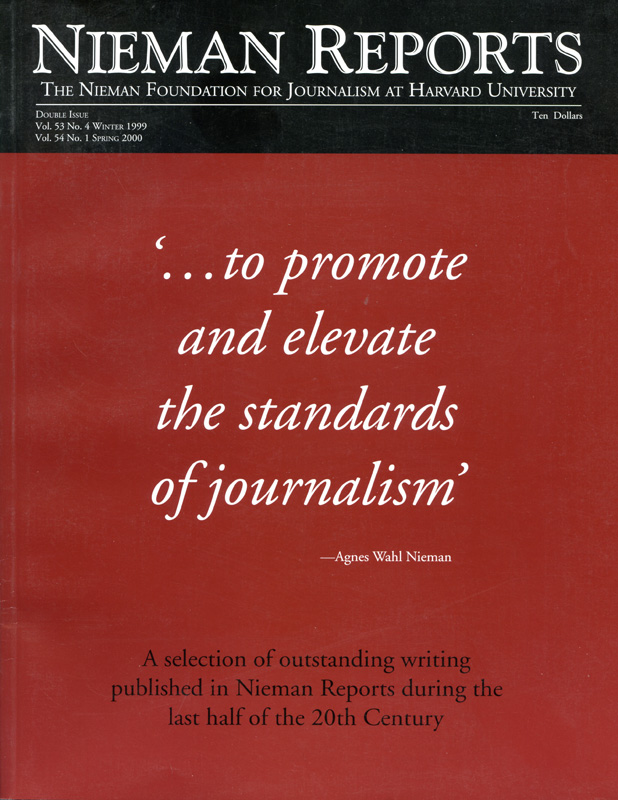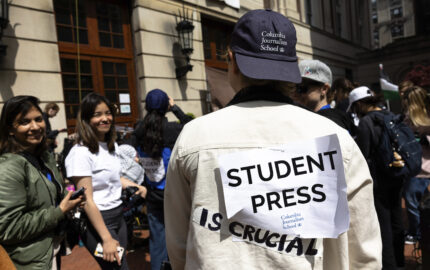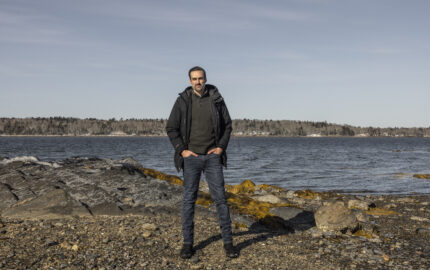
Commemorative Double Issue
What you [see] here is a collection which reflects the substance of the first 53 years of the conversation journalists have engaged in about their rights and responsibilities in the pages of Nieman Reports. At times you will find an article that opened a new argument or ended an old one. Throughout you will hear the voices of journalists committed to their work challenging colleagues to raise the standards of discovering, reporting, writing and editing the news in a context meaningful for navigation within a free society. – Bill Kovach
[This article originally appeared in the October 1951 issue of Nieman Reports.]
The writer [Walsh], a former newspaperman, has often been troubled by the question of what is the best education for journalism. He took up teaching to give students the benefit of his 20-odd years of experience and found many students who would not take journalism because editors or other teachers told them the straight liberal arts course was the best preparation. He found many newspapermen in his own experience who felt the same.
Roy M. Fisher , Chicago Daily News
I think much of the present journalism curriculum is a waste of time. At least, it does not represent the maximum use of time. Men who intend to work on newspapers the rest of their lives should make full use of their short college years to acquire a knowledge of history, government, economics, science and the other subjects upon which they later will be expected to hold a working knowledge. Not that I believe the courses in journalism subjects should be completely forsaken. I think they should be telescoped into less space. It is enough if they give the student a general idea of what working on a newspaper means in terms of the hour-to-hour routine. He can refine the skills later.
Angus MacLean Thuermer , AP Chicago
I cannot see what good the technical courses in writing news stories, learning how to count heads, and page makeup, are when stacked up against other courses that could be taken in the time spent on these subjects. When you come into a newspaper office, you have to learn how to count heads, etc., etc., and if you don't pick that up in a couple of weeks under a good city editor, you better go back and sell bonds.
More and more good men are coming from schools of journalism, it is true, but I weep to think of all the broad courses that could be taken in place of copyreading. Though far from a scholastic shark, I passed five hours of journalism proficiency tests without cracking a textbook just by working on the old college daily and listening as hard as I could in the composing room.
Sylvan H. Meyer , Gainesville (Georgia) Daily Times
My two pet theories are: (1) journalism schools overlook training in newspaper finances and management; (2) journalism schools overlook the fact that 80 percent of the newspapers in this country are under 25,000 circulation and that these papers require all-round people who have curiosity, which can make local stories from apparently insignificant information, who are versatile and can handle, in one day, an editorial, a book review, a political story, a legal story, the press wire, headlines, layout and, in the meantime, peddle a couple of ads.
Simeon S. Booker, Jr. , Cleveland Call-Post
I think journalism schools, as yet, have made no great impact on the American newspaper game. Their biggest duty will come in improvement of typography, editorial writing and such, but their work has yet to be done on a sizeable basis. Journalism schools will never change the American journalism field at the top brass level, but by producing young men who have vision and character and ideals they will infect the field with new fresh blood and vim. And we may grow stronger and healthier in journalism morally. I make two points: (a) future journalists should have strong, all- around college backgrounds, and (b) journalism courses should include a certain apprenticeship program with work on live newspapers.
Hoke M. Norris , Winston-Salem Journal
Certainly one should be taught the mechanics of journalism if he's going to be a newspaperman. He should know the framework of a news story, an editorial, and a feature story, as well as something about staff organization, type and composition, covering a beat, rewrite and, perhaps, the business management and financing of a newspaper. However, I believe these subjects can be covered in a very short time perhaps in a single course of half a year. The major emphasis should not be, I think, on how to write, but on what to write, lest the prospective reporter become like an empty flask, all form no content. I do think the liberal arts education is the best preparation for journalism. Journalism electives in junior and senior years might be just what I have in mind, except they should be brief courses, as brief as possible. I certainly wouldn't devote an entire four-year college course to journalism. When an editor hires a reporter, it is assumed that he can write. Writing aptitude can be sharpened by schooling, but if the basic talent is lacking, nothing in the world can make a newspaperman of one. A man who has the talent doesn't need to learn how he needs to learn what. The best school of journalism in my opinion is the city room. Why not let the student go to work in one?
Louis M. Lyons , Curator of the Nieman Foundation
In general, I am for providing the maximum chance for studies of a general nature, history, literature, economics, sociology, etc., and a minimum time on techniques of journalism. But just what that minimum should be I would not attempt to prescribe for varying conditions. If you ask, a minimum for what: I should say a minimum for getting a job; for I am sure that techniques are best learned, and most rapidly, on the job under most conditions. If a student has a good general education already having completed a liberal arts program, then I see no objection and some advantage in concentrating on techniques as in a graduate year like Columbia's.
My impression is that journalism programs are tending toward a greater concern for educational background and a lesser time for techniques, and that this is, in most instances, good. But I can imagine situations in which an able team of technicians might put up a better educational experience for the student than the general education curriculum, and I have a friend teaching journalism who insists that his journalism course is the strong thread that ties together all the content courses of his students because he makes them read and write so as to report on what they are learning, and turn it all into good journalism. That is splendid, but, I suspect, exceptional.
Edward A. Walsh is an instructor in journalism at Fordham University.
The writer [Walsh], a former newspaperman, has often been troubled by the question of what is the best education for journalism. He took up teaching to give students the benefit of his 20-odd years of experience and found many students who would not take journalism because editors or other teachers told them the straight liberal arts course was the best preparation. He found many newspapermen in his own experience who felt the same.
Roy M. Fisher , Chicago Daily News
I think much of the present journalism curriculum is a waste of time. At least, it does not represent the maximum use of time. Men who intend to work on newspapers the rest of their lives should make full use of their short college years to acquire a knowledge of history, government, economics, science and the other subjects upon which they later will be expected to hold a working knowledge. Not that I believe the courses in journalism subjects should be completely forsaken. I think they should be telescoped into less space. It is enough if they give the student a general idea of what working on a newspaper means in terms of the hour-to-hour routine. He can refine the skills later.
Angus MacLean Thuermer , AP Chicago
I cannot see what good the technical courses in writing news stories, learning how to count heads, and page makeup, are when stacked up against other courses that could be taken in the time spent on these subjects. When you come into a newspaper office, you have to learn how to count heads, etc., etc., and if you don't pick that up in a couple of weeks under a good city editor, you better go back and sell bonds.
More and more good men are coming from schools of journalism, it is true, but I weep to think of all the broad courses that could be taken in place of copyreading. Though far from a scholastic shark, I passed five hours of journalism proficiency tests without cracking a textbook just by working on the old college daily and listening as hard as I could in the composing room.
Sylvan H. Meyer , Gainesville (Georgia) Daily Times
My two pet theories are: (1) journalism schools overlook training in newspaper finances and management; (2) journalism schools overlook the fact that 80 percent of the newspapers in this country are under 25,000 circulation and that these papers require all-round people who have curiosity, which can make local stories from apparently insignificant information, who are versatile and can handle, in one day, an editorial, a book review, a political story, a legal story, the press wire, headlines, layout and, in the meantime, peddle a couple of ads.
Simeon S. Booker, Jr. , Cleveland Call-Post
I think journalism schools, as yet, have made no great impact on the American newspaper game. Their biggest duty will come in improvement of typography, editorial writing and such, but their work has yet to be done on a sizeable basis. Journalism schools will never change the American journalism field at the top brass level, but by producing young men who have vision and character and ideals they will infect the field with new fresh blood and vim. And we may grow stronger and healthier in journalism morally. I make two points: (a) future journalists should have strong, all- around college backgrounds, and (b) journalism courses should include a certain apprenticeship program with work on live newspapers.
Hoke M. Norris , Winston-Salem Journal
Certainly one should be taught the mechanics of journalism if he's going to be a newspaperman. He should know the framework of a news story, an editorial, and a feature story, as well as something about staff organization, type and composition, covering a beat, rewrite and, perhaps, the business management and financing of a newspaper. However, I believe these subjects can be covered in a very short time perhaps in a single course of half a year. The major emphasis should not be, I think, on how to write, but on what to write, lest the prospective reporter become like an empty flask, all form no content. I do think the liberal arts education is the best preparation for journalism. Journalism electives in junior and senior years might be just what I have in mind, except they should be brief courses, as brief as possible. I certainly wouldn't devote an entire four-year college course to journalism. When an editor hires a reporter, it is assumed that he can write. Writing aptitude can be sharpened by schooling, but if the basic talent is lacking, nothing in the world can make a newspaperman of one. A man who has the talent doesn't need to learn how he needs to learn what. The best school of journalism in my opinion is the city room. Why not let the student go to work in one?
Louis M. Lyons , Curator of the Nieman Foundation
In general, I am for providing the maximum chance for studies of a general nature, history, literature, economics, sociology, etc., and a minimum time on techniques of journalism. But just what that minimum should be I would not attempt to prescribe for varying conditions. If you ask, a minimum for what: I should say a minimum for getting a job; for I am sure that techniques are best learned, and most rapidly, on the job under most conditions. If a student has a good general education already having completed a liberal arts program, then I see no objection and some advantage in concentrating on techniques as in a graduate year like Columbia's.
My impression is that journalism programs are tending toward a greater concern for educational background and a lesser time for techniques, and that this is, in most instances, good. But I can imagine situations in which an able team of technicians might put up a better educational experience for the student than the general education curriculum, and I have a friend teaching journalism who insists that his journalism course is the strong thread that ties together all the content courses of his students because he makes them read and write so as to report on what they are learning, and turn it all into good journalism. That is splendid, but, I suspect, exceptional.
Edward A. Walsh is an instructor in journalism at Fordham University.


